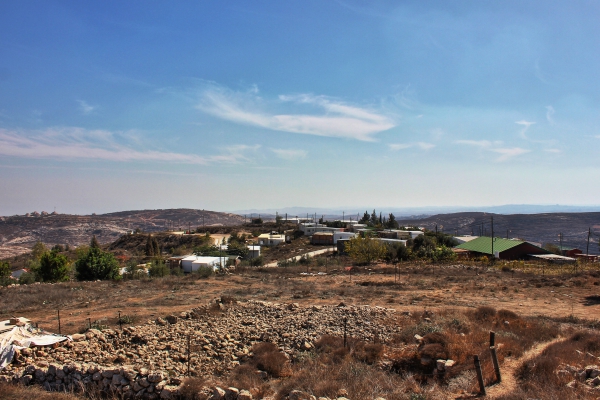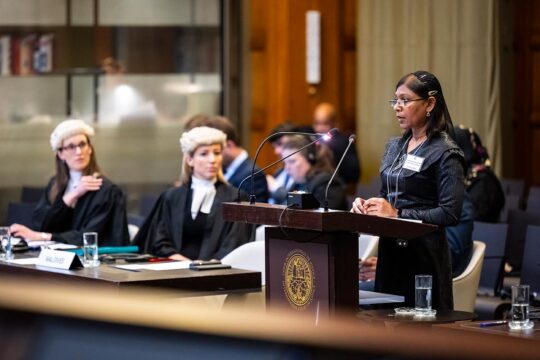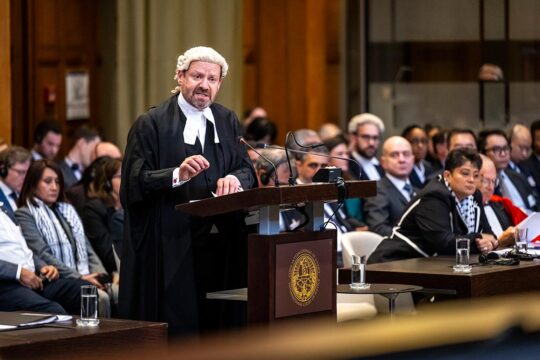Transitional justice, the focus of our website, is still a little understood concept, according to Kora Andrieu, an expert in the field. “The problem with transitional justice, he says, is that the term can be taken to mean that it is justice which is in transition, whereas the idea is rather justice applied to the special context of democratic transitions.”
And so this week, whether before the courts of Israel or France, transitional justice continued trying to forge its identity.
The Israeli case is emblematic. Settlers on Palestinian land and their allies in the Knesset (Israeli parliament) are trying to change the law to legalize outposts (which are illegal under Israeli law as well as international law), especially with regard to their outpost of Amona. “In Amona, the case has always been clear for the Israeli army, as for the Israeli courts,” writes our correspondent Aude Marcovitch. “This outpost was built on private land. But whereas the Civil Administration, the branch of the army responsible for managing the Occupied Territories, had called on the inhabitants of Amona to leave, government ministries have several times provided financial support to this outpost.” The Israeli Supreme Court is to rule by December 25 on this ambiguity, called into question by the legal Palestinian owners of the site and Israeli civil society.
And still on justice, there have been developments at the International Criminal Court (ICC). Gambia’s withdrawal from the Court, announced at the end of October by its dictator of 22 years Yahya Jammeh, looks like being reversed by the new president of this small West African country, Adama Barrow. This withdrawal announcement was one of the last crazy acts of the dictator, whose former Justice Minister Fatou Bensouda is nevertheless Prosecutor of the ICC. As our editorial advisor Pierre Hazan writes, Jammeh could now find himself before the ICC. It is decidedly better to make decisions on justice with all your wits about you.
This week, the ICC also started one of its most awaited trials, that of Ugandan Dominic Ongwen, a child soldier captured by the Lord’s Resistance Army (LRA) who became a cruel war criminal, according to the Prosecutor.
According to Stéphanie Maupas, JusticeInfo’s correspondent in The Hague, “it was not really the portrait of a child soldier drawn by the Prosecutor”. Fatou Bensouda nevertheless decided to tackle the victim-perpetrator issue head-on. It is also a subject of debate in Uganda, including for ex-child soldiers who surrendered and are still struggling to forget their past. Dominic Ongwen “was also a victim”, declared Bensouda. But for Fatou Bensouda, what happened in Ongwen’s youth does not justify any of his crimes. And when other LRA fighters decided to surrender to the Ugandan army in return for amnesty, Ongwen decided to continue fighting.
Justice also for Ratko Mladic, whose trial before the International Criminal Tribunal for the former Yugoslavia (ICTY) is drawing to an end after four years. The ICTY Prosecutor requested life imprisonment for the former head of Bosnian Serb armed forces, who is accused of crimes against humanity and war crimes committed between 1992 and 1995 in Bosnia-Herzegovina.
And finally justice for Pascal Simbikangwa, the first Rwandan to be tried for genocide before a French court. The Court of Appeal in Bobigny, on the outskirts of Paris, this week confirmed the 25-year prison sentence handed down on him in March 2014 for participating in genocide and crimes against humanity in Kigali between April and July 1994. “His appeal finally came to nothing,” writes Franck Petit, JusticeInfo’s special envoy to the Bobigny court. And Franck Petit adds: With this verdict in the Simbikangwa case and the July 6 conviction of two Rwandan ex-mayors by a Paris court, 2016 has been a busy trial year for France’s special crimes against humanity unit. It currently has some 15 investigations under way on Rwandan genocide suspects residing in France. This should therefore be just the start of Rwandan trials in France under the principle of universal jurisdiction. But there is the risk of a logjam for these long and costly trials.”






